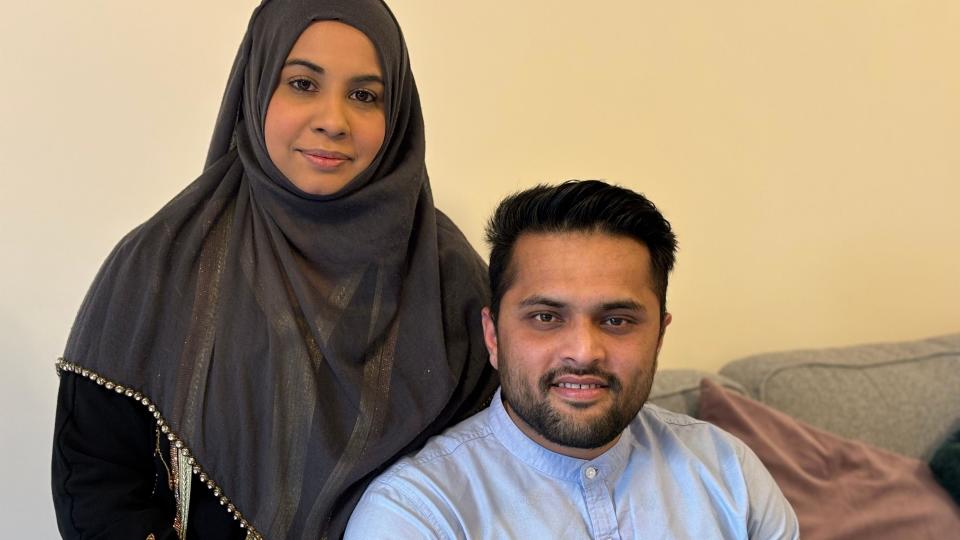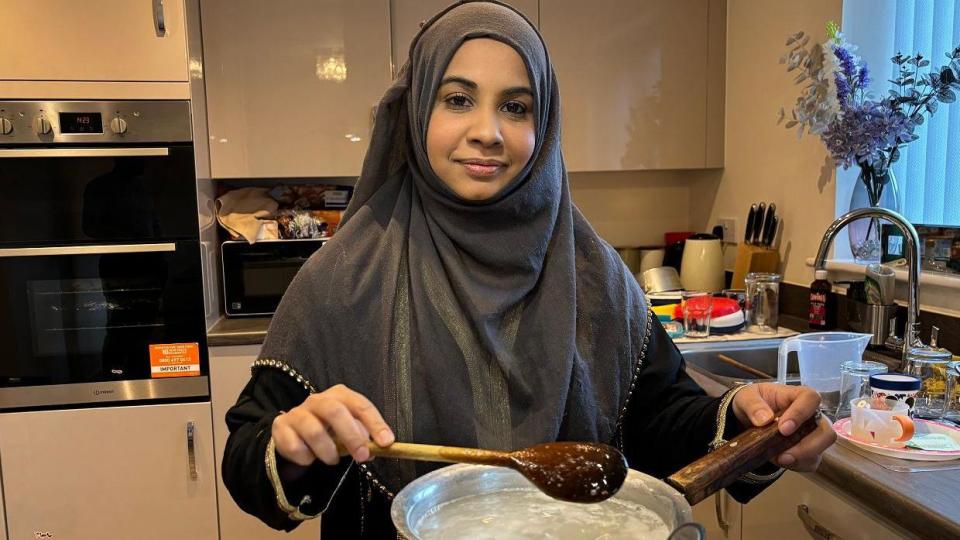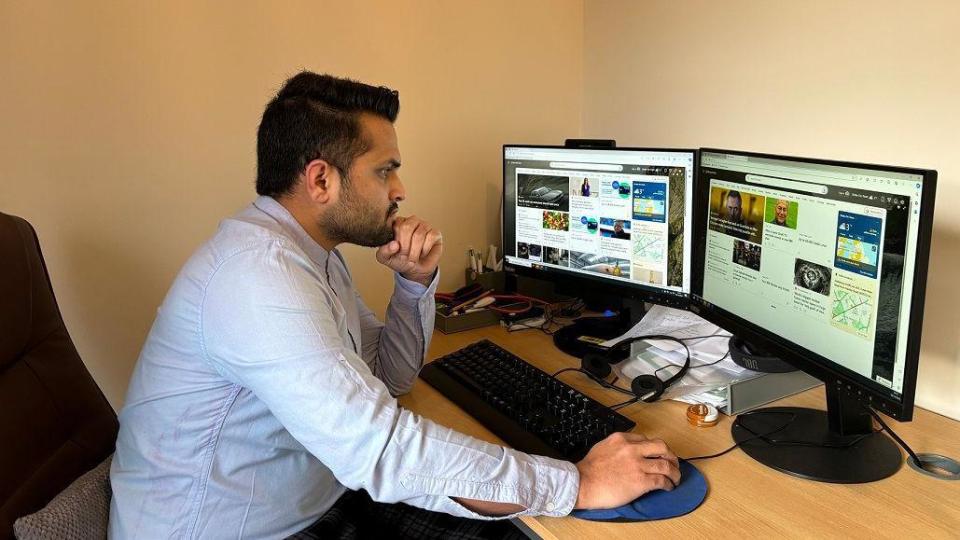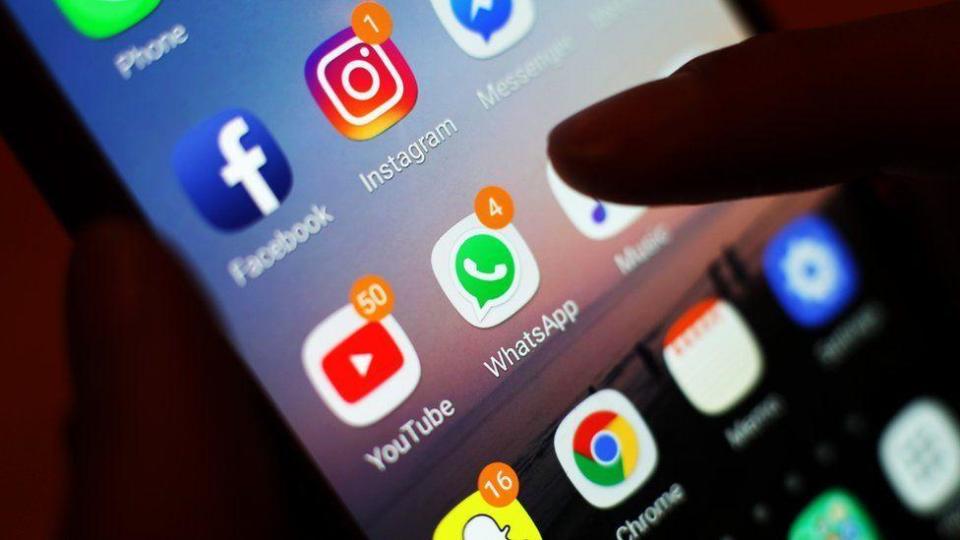Bangladeshi women left 'suicidal' by TikTok troll
Women from the Bangladeshi community in the UK say their lives are being ruined by a TikTok troll, a BBC investigation has found.
Despite reporting threats and abuse to police forces in the UK and France as well as social media companies, many said they have been left feeling suicidal and desperate because no-one was taking any action to stop it.
“I felt like the sky had fallen in on me. I was in tears. I could not eat, I struggled to sleep.
"I felt like I did not want to be here anymore.”
Sultana (not her real name) lives in Yorkshire and used TikTok to speak out about issues important to her like misogyny and toxic relationships.
She said she became a victim of this troll on the social media platform in 2021 after she defended a friend on TikTok who was also targeted by him.
Warning - this story contains details which readers may find distressing.
Sultana was at work when some of her followers on TikTok messaged her and asked if she had seen the videos that he had posted about her.
“People were commenting on the post and laughing at me," she said.
The abuse carried on sporadically for two years and she said it was something "you never get over".
“I have always struggled with my mental health and I have had intense therapy to get over this but it triggered my PTSD (post-traumatic stress disorder)," Sultana said.
"I felt that all of the hard work I had done to get better went down the drain.”
TikTok is big among the Bangladeshi community in the UK, especially women.
Typically a conservative community, the social media platform gives them a voice to speak out.
But it also appears to make them a target as those who have been abused said some men in the community do not agree with women voicing their opinions online and seek to silence them.
The troll targeting Sultana and others - many of whom told the BBC they were afraid of speaking out - is a man called Hasan Syed, a Bangladeshi national who lives in the suburbs of Paris and has thousands of followers on TikTok.
He torments and terrorises people by stealing personal photographs and information from their social media feed and puts them on a "green screen" in videos.
Mr Syed then goes live on TikTok, sometimes makes fun of their appearance and makes threats to rape and kill.
The BBC has contacted him several times by email and attempted to call him but has had no response.

Masuma lives in Wales with her family, works in higher education and hosted live cookery demonstrations on TikTok and ran a shop on the platform.
She was live on it one day when Mr Syed appeared and asked to be invited on as a guest but when she refused he threatened to "hang her".
Masuma shared a video and urged others to report him but said she became a target.
“He made videos of me saying that I was a sex worker,” she said.
Her followers reported the video to TikTok and it was eventually taken down but Masuma said it damaged her life.
“The repercussions were severe, I had to remove all of my photos, my business phone number and reduce my live sessions, due to my heightened anxiety," she said.
"I received inappropriate calls and faced embarrassing inquiries from students.”
“Despite reporting the situation to the police with substantial evidence, their inability to take effective action left me feeling helpless.”

Kamrul Islam's first encounter with the TikTok troll was in January 2023 when he came across Mr Syed's channel and said he was appalled by what he saw.
“At first I thought the videos were fake but friends told me that Mr Syed had been targeting people in the UK for a number of years," he said.
Mr Islam, who lives in Staffordshire with his wife and two young children, said Mr Syed had a large following on TikTok and "people think he is untouchable".
“The Bangladeshi community are very conservative and these videos bring great shame to families, as well as fear. I knew I had to do something to try and stop it," he said.
'I was crying my eyes out'
Mr Islam made contact with Mr Syed online to ask him to stop but it immediately put him and his family in the firing line.
“He started making videos about me, he got some pictures of my son [from when he was a year old], my mum and my wife from my Instagram account and openly threatened to rape them," he said.
Mr Islam’s wife, Rukthan, was seven months pregnant at the time with their second child and he told her everything and decided to call the police.
“It was very stressful for me. I was crying my eyes out and I felt scared because many of [Syed’s] followers live in the UK," his wife said.
"I love walking and I used to drop my son off at school and go for a stroll. After [his] followers said they were going to attack my family, I became too scared to go out.
"I can no longer work because of my mental health and I still have sleepless nights.”

After reporting Mr Syed to Staffordshire Police, the father-of-two got in touch with TikTok to demand they take down the videos.
He said he was shocked to be told they found "no violation" of their community guidelines.
Undeterred, Mr Islam contacted the British Embassy in Paris in February 2023 to ask for their help and they put him in touch with an English-speaking French solicitor, Mathieu Croizet.
Mr Croizet filed a complaint with the Paris Prosecutor's Office alleging Mr Syed had committed three serious offences under French law - repeated threats of violence and rape against an adult and child, child pornography and cyber-bullying.
However Mr Islam said he has had no real updates on how the case is going and his solicitor, Mr Croizet, said it could take a long time to reach a conclusion.
"The French justice system is understaffed and has a limited budget," he added.
“Protecting minors is something the French justice system has promised to do but in France it is almost impossible to get abusive posts online taken down, even if they are making violent threats.”
He also told the BBC that “there is a lot of Islamophobia in France and Kamrul’s surname being Islam could be blocking the case".
The BBC contacted the central police station in Paris and the courts in Versailles about updates on the case but have had no reply.
Mr Islam said he had similar frustrations with delays in Staffordshire as, after his report to police, it took two-and-a-half months before they confirmed his complaint was passed to Interpol.
The force’s professional standards unit reviewed how they dealt with the case after he complained but decided no further action would be taken.
During all this time, Mr Syed kept posting videos about Mr Islam's family on YouTube, Facebook and TikTok.
The father-of-two’s demands for the posts to be taken down went unanswered but Mr Islam refused to give up.
In April 2023 he contacted the Information Commissioner's Office (ICO) and they took action.
After viewing and translating the videos, the ICO told Mr Islam it was “deeply concerned” about their content and disagreed with the social media companies' refusals to remove or block the videos.
They highlighted the use of his child’s personal data and ordered TikTok, Facebook and YouTube to remove the content within seven days.
“They have been brilliant,” Mr Islam said. “They are the ones who have helped me the most.”
A spokesperson for the ICO said if concerns were raised about the use of personal data "we expected organisations to take these complaints seriously and investigate".

In a statement, TikTok said it removed video and banned accounts which broke its community guidelines in this case and "continues to improve our enforcement against this kind of behaviour”.
A YouTube spokesperson said they did not allow harassment and cyber-bullying and on reviewing the channel used by Mr Syed they had "terminated" it.
The Facebook page was disabled and content posted by Mr Syed removed after an investigation, a spokesperson for Meta, which owns Facebook, said.
"Our enforcement is not perfect and sometimes both machines and humans make mistakes. That is why we are constantly working to improve our ability to detect and remove violating content from our platforms," they added.
'They try and silence us'
Mr Islam now uses his social media accounts to expose Mr Syed and support other victims and he said scores of other Bangladeshi women in the UK have contacted him asking for help.
“I get so many messages from sisters across the country who have been seriously bullied on TikTok," he said.
Many told him they felt like they wanted to take their own life "because they do not get any help or support from the social media platform”, he added.
Sultana said a lot of men in Bangladesh did not agree with women having their voice on social media "so they try and silence us by bullying and harassing us".
"Nothing is ever done about it so they get away with it over and over again and have been for ages," she added.
"The authorities need to take these things more seriously, as it is very damaging.”
Mr Islam said he was contacting TikTok almost daily, asking them to take down new accounts Mr Syed has opened up, making threats against him and his family and said action was not always taken promptly.
He urged women in the community to speak up as "if you just stay quiet, these monsters will carry on damaging people.”

After years of debate, the government’s Online Safety Bill - which ministers said aims to make the internet safer for children - became law on 26 October.
People should report any threats they receive to police as social media firms were now responsible for tackling illegal content, a spokesman from the Department for Science, Innovation and Technology said.
"If they do not identify and take down criminal threats promptly and effectively, they could face eye-watering fines that could reach billions of pounds, regardless of whether those posting content are based in the UK," he added.
Ofcom, the communications regulator, now has extra enforcement powers and platforms must show they are committed to removing illegal content, including child sexual abuse, controlling and coercive behaviour and extreme sexual violence.
But the watchdog is still consulting on how the act will be implemented and enforcement action will not be taken for many months.
If you have been affected by any of the issues raised in this article, help and advice can be found on the BBC Action Line.
Follow BBC West Midlands on Facebook, X and Instagram. Send your story ideas to: newsonline.westmidlands@bbc.co.uk


